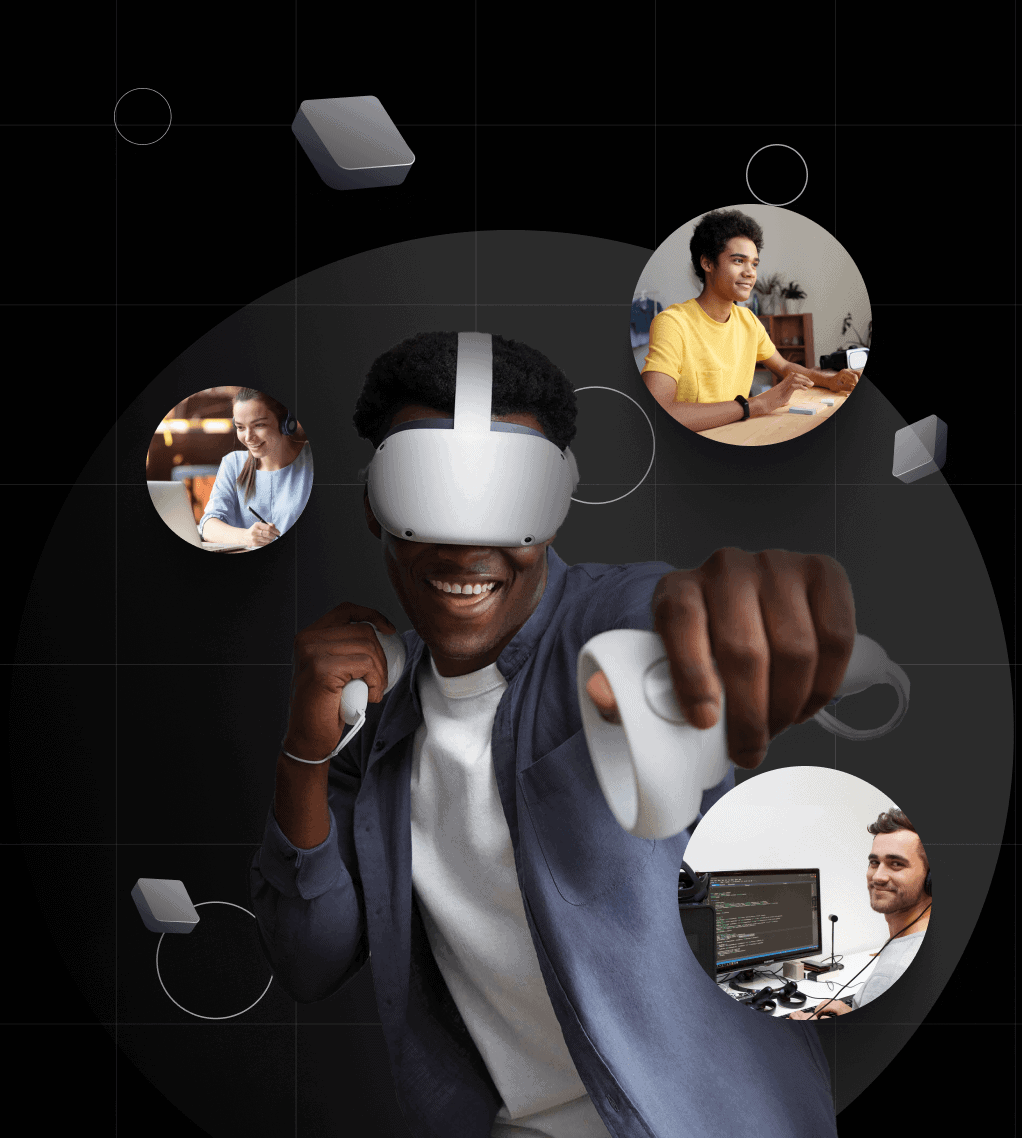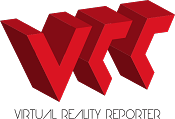Best Places to Learn AR, VR, XR Development

The term Metaverse is a hot trending term in the recent months. If you don’t know what a Metaverse is, please see our complete guide to the Metaverse. In short, the Metaverse combines XR (augmented reality, virtual reality) crypto currencies, NFTs, and blockchain technologies that experts predict will be bigger than the Internet revolution.
The XR industry is expected to grow by 25.13% by 2021 and reach $296.9 million in global market by 2024. The industry will benefit from education opportunities that prepare students for the rising demand of the industry.
Although there are many platforms that enable you to create virtual reality and augmented realities apps and content, it can be difficult to find a virtual school or academy to train those who are interested in developing AR/VR apps.
Unity 3D is the standard for creating and deploying augmented or virtual reality applications for beginners and experts. Unreal Engine 4, however, is a more common industry standard but has a steep learning curve. Google Poly allows creators to a large library of downloadable 3D assets and scenes. The Google Poly assets are licensed under the CC BY license, so please be sure to give the original credit to use their content. You will also want to learn programming language such as C++.
If you are looking the best places to learn how to develop content for AR, VR, and XR space, you are in the right place. In this article, we will go over some of the best courses to learn how to develop VR and AR apps and content.
Circuit Stream
Circuit Stream has been teaching AR/VR development since 2015. The company offer workshops, corporate training programs and XR Development with Unity. They offer education services as well as a platform that makes AR/VR applications easy to create and commercialize.
The XR Development with Unity course is beginner friendly 10-week-long program that's easy to follow and accessible online. Through project-based lessons and mentorship, students learn the basics of augmented reality and virtual reality development.
This company is a well-respected expert in Unity training and provides certifications in XR development to individuals and businesses worldwide. The training partners are chosen based on their commitment to provide the best training possible.
Circuit Stream offers a variety of free AR and VR workshops each month, as well as a variety of workshops that can be accessed anytime.
University of British Columbia (UBC), University of Toronto of Continuing Studies, (UofT SCS), launched new extended reality XR training programs in partnership with Circuit Stream, but it is certainly not cheap, with a tuition ranging from $3950~4950USD.
These courses, which are project-based, will help students to earn certifications that they have the necessary hands on skills for the rapidly expanding 3D technology market.
The XR courses are taught by professionals from companies such as Nike, Shopify and Facebook. Many Circuit Stream graduates have moved on to different tech companies after graduating.
Students receive an XR Developer/XR Designer certificate from UBC or UofT upon completion. They also have the opportunity to earn an Associate Certificate from Unity.
These are the three courses offered:
- XR Development: This 10-week online course teaches you the basics of Unity's XR application creation.
- XR Design: This 10-week online course explores best practices for designing and prototyping intuitive, usable, and human-centered experiences.
- C# Scripting is a 4-week course that covers C#, Unity's core programming language.
Coursera
Coursera teaches you the basics of Augmented Reality. It starts with The Introduction to Augmented Reality and ARCore. The free course is available online and can be completed in just four weeks. A certificate can be purchased for $29.
This course teaches you how to identify AR experiences and how to use Unity and Google Poly platforms to build them. It also demonstrates how to use the tools and techniques of building AR. This course can be completed in just 4 weeks and takes approximately 11 hours.
University of London
The University of London offers a BSc Computer Science degree, with the option to specialize in VR.
The course is offered through Coursera. It takes between three and six years to complete. You can choose to specialize in CGI and animation, VR, and immersive interaction design. Other than VR, you can choose to specialize in Games, web, and mobile development.
Coursera's Unity XR: Building AR and VR Apps Specialization course offers three courses on VR and AR. One of the shorter courses, The Introduction to XR VR, AR and MR Foundations takes 17 hours. It teaches you how to develop two tracks. You can sign up to receive a free 7-day trial, where you have full access and training materials.
Coursesity
Coursesity offers several AR tutorials and courses for free. These include an introduction to building in ARCore and the use of Sceneform to create AR experiences and apps.
You will also learn the basics of VR and 3D interactions, and the techniques used in creating professional VR apps using Unity 3D. This course teaches you how to create VR experiences on major headsets and devices using Unity 3D, and how to setup HTC Vive within Unity. The course includes videos lessons and VR project students must complete.
You can get a certificate for $99 that gives unlimited access to course materials and graded assignments. This certification can also be added to you CV, resume, or directly to LinkedIn.
Edx.org
Online learning platform, Edx.org, was founded in 2012 by Harvard University and MIT. Their VR certification program is one of the programs offered, called the Professional Program Certificate for VR App Development (UCSD). This course will teach you how to create and apply VR software that meets the OpenGL standards. This course teaches students how to create their own AR and VR apps using the same program in just 18 weeks.
The professional certificate in VR App Development costs $267.30 that takes five months to complete. This includes the two introductory courses. You can have the option of paying $99 per certification. You will learn how to create VR apps using Unity, OpenGL and virtual reality hardwares.
EON Reality
EON Reality lets users create XR content tailored for education and training. It allows users create experiences, then publish them to allow others to learn from them or for training. The company has been in the field of immersive training for quite a long time, and already have a publishing library that contains thousands of 3D and 360-degree immersive assets for those wishing to learn through XR.
LinkedIn - Lynda.com
The VR Foundations course on Lynda will teach the foundations in VR applications, and how to develop content and apps. The course is taught by Craig Barr who also teaches another one named Virtual Reality Overview for Developers, which teaches developers to learn the tools they need to use for VR development.
All content and expert instructors from Lynda.com are now on LinkedIn Learning. You can take this course with a free month subscription at LinkedIn. That means you would have to subscribe on LinkedIn premium account which can be activated immediately for a 30-day trial period after you submit payment information.
Packt
Packt's Online Course: Building Your First VR Experience With Unity takes just five hours. You can learn how to use Unity's interface, script your first C# codings, and create a VR experience using Unity.
Packt offers a solid foundation in 3D modeling, coding with C#, interaction design, SDK, and general best practices in VR.
You can also take the course for 23.80 Euro. However, a 10-day free trial is available. You can also download the code files for free. Packt offers this course for a free trial. But you must submit your payment details first.
Udacity
Udacity, a popular training platform, focuses on VR mobile and core Unity game engines as well as C# development. Students will learn all the latest technologies and tools that can be used to create VR with their VR Mobile Nanodegree program.
The program runs for four months and covers the basics of VR, ergonomic, and interface design. You will learn the foundation necessary to take on VR design jobs.
This course cost $999 that teaches you how to produce 360 media and optimize mobile performance, such as solving over-heating problems. You can go on to become a AR/VR developer, 3D programmer, or game designer for Unity, Web, iOS, an Android.
To enroll in this course, you will need intermediate computer skills, file management skills, how to work with Unity, and some experience with object-oriented programs.
Udacity also offers a free Introduction course from Google VR. This course is two weeks long and teaches beginners how to program for VR. You do not need any programming experiences.
Udemy
Udemy's The Complete Virtual Reality Game Development teaches you how to develop games and apps on Oculus, Vive, Samsung Gear VR, and mobile VR for iOS and Android.
The teacher, Pablo Farias Navarro, has been a game developer since 1996. His 50+ classes has been delivered to +250,000 people.
In this class, students will also be able to develop two hands on projects (i.e., "Flying platform" & "Night with Moths). Beginners will learn to create VR games through coding with C#.
A separate course called How to create VR experiences using Unreal Engine in C++ teaches you how to create apps for Oculus and SteamVR.
This course was developed in partnership with Epic Games. Students will learn how to create games in VR through mechanics such as object orientation, spatial UI, and teleportation.
Udemy's Internet of Things with Augmented Reality in Unity (IoTAR) course teaches you how to create AR Internet of Things experiences with Unity and Vuforia on Particle Photon. You will learn how to use AR Internet of Things in healthcare and other areas, such as visualizing the temperature of any liquid chromatically.
Udemy's Oculus Quest and Unity are designed for Unity game developers who want to get started with virtual reality games using Oculus Quest headsets.
This course covers all aspects of VR game development. It teaches you how to create immersive virtual reality experiences using Unity. The course was developed by Zenva Aacdemy which covers the building blocks of Unity for mobile and desktop VR platforms such as Oculus, Gear VR, and HTC VIVE.
You can learn skills to build your own VR/AR/MR apps using 3D game development with the Extended (XR)- Building AR/V/MR Projects course. This course will give you an in-depth knowledge of the VR/AR/MR landscape, and teach you how to create apps.
You will learn how to create apps with PlayCanvas engine and to deploy your first VR app on mobile. Scenekit is a high-level 3D graphics framework that allows you to publish and distribute apps on different hardware devices.
This course will equip you with the skills necessary to launch AR content to web browsers with PlayCanvas, create AR applications using iOS ARKit and create VR experiences. You can also view the content in Google cardboard or DayDream.
Udemy's five-hour lecture series Building your first VR Experience with Unity will help beginners get started in VR. This course will help you create your first VR app. It will also teach you the basics of 3D modeling, C# programming, VR design, SDK, and other best practices.
This course teaches you how to create a basic UI, interact with VR, and write C# components. You also learn professional workflow tricks, shortcuts, and techniques that professionals use. It also includes 52 lectures, 1 downloadable resource, 4 articles and full-time access.
The Unreal Engine 4: Project Based VR Course for Arch Viz. UE4 prepares students to work with 3D models and import them into a game engine, including animation and lighting.
This course teaches learners how to create photo-realistic, instant rendering, animations and animations using UE4, learn scripts and blueprints, and set up VR experiences with models. It also includes more than 80 lectures, 9 articles, and 5 downloadable resources.
React VR – Creating Virtual Reality Apps course will help you become a highly demanded software engineer capable of creating VR applications. You will learn how develop in VR using React.js and ReactVR. ES6 and JavaScript. You will learn how to build applications that work with APIs. You will learn how to create shapes using React VR, models and animation.
The course, Build Virtual Reality Games For Android and iPhone V,R is for those who are interested in learning how to build VR apps for Android or iPhone using Unity. Learners will learn how to publish VR games quickly on Android and iPhones, as well as how to convert existing games into VR.
Skillshare
Skillshare learning platform allows people to exchange ideas and learn online. There are many free tutorials and lessons on how to improve your VR and AR skills.
One course is Development of AR apps with Unity, and another course teaches you how to create Augmented Reality games. Another course teaches you how to make Vuforia AR applications using Unity SDK.
There are also several courses that you can take for free. You can learn how to create VR content using Unreal Engine, WebVR, and Unity.
Meta’s Spark AR Studio
Meta (previously known as Facebook) released their Spark AR Studio Tool allows users to create AR effects for their mobile devices. Facebook launched Spark AR in 2017 and has continued to improve the platform. Recently, Facebook added analytics for Instagram and Facebook Campaigns.
SoloLearn
To advance your skills in C++, SoloLearn can be used to quickly learn the basics of several programming languages. C# is the easiest language to learn, and it works well with Unity. However, you can also use SoloLearn to learn C++ and other languages. SoloLearn can be used easily from your smartphone. To move forward, the tutorials will go through a checkpoint system that includes modules and questions. You will receive a certificate of completion at the end.

